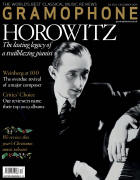Texte paru dans: / Appeared in: |
|
|
Outil de traduction (Très approximatif) |
|
|
Reviewer:
Richard Wigmore Handel the stage composer was not quite the finished article when he composed Rodrigo for Florence in the autumn of 1707. Potentially strong dramatic situations can go begging in a tale of lust and ambition that centres on the ruthless, over-sexed Castilian King Rodrigo, callously betraying both his devoted wife and his pregnant mistress. Doubtless pressed for time (when wasn’t he?), Handel lifted many of the arias from his Roman cantatas, with casual regard for character and dramatic context. Don’t look here for the musical and psychological subtleties of Handel’s finest London operas. Yet at its best, the music of Rodrigo has an invigorating freshness, its raw, sometimes gawky energy tempered by an Italianate melodic suavity that Handel had honed in his cantatas. Two decades ago Rodrigo was well served by its first recording, directed by Alan Curtis. Without necessarily eclipsing it, this new version, taken from a performance at last summer’s Göttingen Handel Festival, has many of the advantages of live recording and a few of the drawbacks – occasional rocky ensemble, intermittent stage clatter. Laurence Cummings directs his expert band of Handelians with more theatrical flair and rhythmic brio than Curtis; and the recitatives, sensibly pruned (uncut they can seem interminable), move at a livelier, more natural pace. With one exception, the singing is excellent. Handel cast the unlovely Rodrigo with a high castrato. Cummings uses a soprano. If a deepertoned, more masculine-sounding mezzo would have made for a better contrast with the two women, Erica Eloff dispatches her extrovert numbers with bravado and softens her tone affectingly when the tyrant improbably morphs into a devoted pussycat. Rodrigo’s love song to Esilena, ‘Dolce amore’, is tender and touching. The spurned mistress Florinda spends most of the opera baying for vengeance, and who could blame her. From her opening salvo ‘Pugneran con noi le stelle’, Anna Dennis tears into her bravura solos with terrific gusto, and brings a rueful inwardness to the delicately scored aria ‘Fredde ceneri d’amor’ that helps make Florinda a more rounded character. Dennis is far preferable to Curtis’s wildly over-the-top Elena Cecchi Fedi. As Rodrigo’s masochistically long-suffering wife Esilena, Fflur Wyn is every bit a match for Sandrine Piau on the rival recording, praise indeed. She beautifully catches the mingled agitation and pathos of the superb ‘Empio fate’ and the grieving tenderness of ‘Perchè viva il caro sposo’ – one of several arias sadly shorn here of their ‘B’ section and da capo – and is delightfully blithe as she looks to a happy future in the catchy ‘Si che lieta’. Wyn’s poise and coloratura brilliance even converted me to Esilena’s overlong showpiece with violin solo that closes Act 1. Of the men, Russell Harcourt’s strained, squally countertenor is miscast as the rival monarch Evanco, a role written for a female soprano. Tenor Jorge Navarro Colorado, as Florinda’s pugnacious brother Count Giuliano, sounds tight and slightly flustered in his opening aria. But he soon warms to the part, impressing both in militaristic swagger (his default mode) and in two lyrical arias, both charming, if out of character. Handel opera lovers will hardly go wrong with either version of Rodrigo. (A third recording, from Eduardo Lopéz Banzo, is too erratically directed and sung to be a front-runner.) Curtis, using his own edition of an opera that contains lacunae (several of Handel’s arias are lost), offers more music, especially in Act 3, and has by far the better Evanco. Against that, Cummings fields the more consistently satisfying cast, and makes the opera more dramatically compelling – the clinching factor for me. |
|




